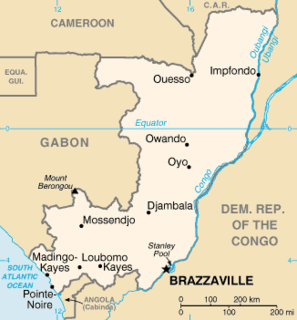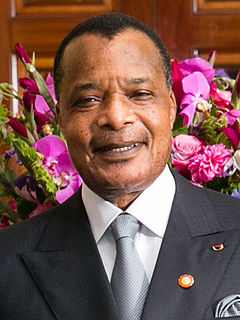
The history of the Republic of the Congo has been marked by diverse civilisations: indigenous, French and post-independence.

Marien Ngouabi was the third President of the Republic of the Congo from January 1, 1969, to March 18, 1977.
Pascal Lissouba is the first democratically elected President of the Republic of the Congo and served from August 31, 1992 to October 15, 1997. He was overthrown by the current President Denis Sassou Nguesso in the 1997 civil war.
Jacques Joachim Yhombi Opango is a Congolese politician. He was an army officer who became Congo-Brazzaville's first general and served as Head of State of the People's Republic of the Congo from 1977 to 1979. He is currently the President of the Rally for Democracy and Development (RDD), a political party, and served as Prime Minister from 1993 to 1996. He was in exile from 1997 to 2007.

Isidore Mvouba is a Congolese politician who was Prime Minister of Congo-Brazzaville from 2005 to 2009. He is a member of the Congolese Labour Party and held key positions under President Denis Sassou Nguesso beginning in 1997.

The People's Republic of the Congo was a Marxist–Leninist socialist state that was established in 1969 in the Republic of the Congo. Led by the Congolese Party of Labour, it existed until 1991 when, following the dissolution of the Soviet Union, the country's earlier name was restored and André Milongo was named transitional prime minister.

André Ntsatouabantou Milongo was a Congolese politician who served as Prime Minister of the Republic of the Congo from June 1991 to August 1992. He was chosen by the 1991 National Conference to lead the country during its transition to multiparty elections, which were held in 1992. He was also the founder and President of the Union for Democracy and the Republic (UDR-Mwinda), a political party. From 1993 to 1997, he was President of the National Assembly, and he was again a deputy in the National Assembly from 2002 to 2007.

A presidential election was held in the Republic of the Congo on 10 March 2002. This followed the country's second civil war (1997-1999), which returned Denis Sassou Nguesso to power, and a subsequent transitional period, in which a new constitution was written and approved by referendum in January 2002.
Stéphane Maurice Bongho-Nouarra was a Congolese politician. He served in the government of Congo-Brazzaville during the late 1960s, and after a long period in exile, he returned and played an important role in the politics of the 1990s. Bongho-Nouarra was briefly Prime Minister of Congo-Brazzaville from September 1992 to December 1992.
Ambroise Édouard Noumazalaye was a Congolese politician who was Prime Minister of Congo-Brazzaville from 1966 to 1968, under President Alphonse Massamba-Débat. Later in life he served as Secretary-General of the Congolese Labour Party (PCT) and was a supporter of President Denis Sassou Nguesso. He served as President of the Senate from 2002 to 2007.
Alphonse Poaty-Souchlaty is a Congolese politician who was Prime Minister of Congo-Brazzaville from 7 August 1989 to 3 December 1990 under President Denis Sassou Nguesso.

Louis Sylvain Goma is a Congolese politician who was Prime Minister of Congo-Brazzaville from 18 December 1975 to 7 August 1984, serving under three successive Heads of State: Marien Ngouabi, Jacques Yhombi-Opango, and Denis Sassou Nguesso. Later, he was Secretary-General of the Economic Community of Central African States from 1999 to 2012, and he has been Congo-Brazzaville's Ambassador to Argentina since 2019.

Pierre Nzé is a Congolese politician and diplomat. During the single-party rule of the Congolese Labour Party (PCT), he held leading positions in the government and party. Later, he was Minister of State for Justice from 1997 to 1999, and he served in the Senate of the Republic of the Congo from 2002 to 2011.
Jean-Pierre Thystère Tchicaya was a Congolese politician. He was briefly acting head of state of Congo-Brazzaville in February 1979 and was President of the National Assembly from 2002 to 2007. He also led a political party, the Rally for Democracy and Social Progress (RDPS), from 1990 to 2008.
Pierre Moussa is a Congolese politician who has been President of the Commission of the Economic and Monetary Community of Central Africa since 2012. He served in the government of Congo-Brazzaville as Minister of Planning from 1979 to 1991; later, he was Minister of Spatial Planning from 1997 to 2002, Minister of Planning from 2002 to 2009, and Minister of State for the Economy and Planning from 2009 to 2012.
Florent Ntsiba is a Congolese politician. A high-ranking and long-time figure under President Denis Sassou Nguesso, Ntsiba initially rose to prominence through the military in the single-party regime of the Congolese Labour Party (PCT) in the 1970s. He was Minister of Information from 1979 to 1983; although he fell out of favor with the party leadership in 1983, he returned to the government as Minister of Equipment from 1989 to 1991.
Claude-Ernest Ndalla is a Congolese politician. First coming to prominence as a radical youth leader in 1960s Congo-Brazzaville, he was one of the leading members of the Congolese Labour Party (PCT) in the period immediately following its founding in 1969, but after a few years his career fell into a long decline due to factional struggles within the PCT. Later, he served in the government of Congo-Brazzaville as Minister of Youth Redeployment and Sports from 1997 to 1999, and he has been a Special Adviser to President Denis Sassou Nguesso since 2003.
André Mouélé is a Congolese politician. During the single-party rule of the Congolese Labour Party (PCT), he served in the government of Congo-Brazzaville as Minister of Culture, Arts, and Sports and as Minister of Labour and Justice in the 1970s. After the introduction of multiparty politics, he briefly served as President of the National Assembly of Congo-Brazzaville from September 1992 to November 1992.






















